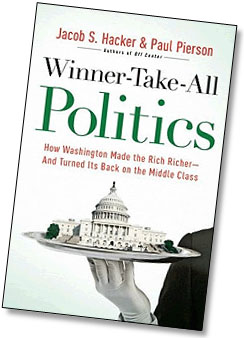This was kind of an odd year in books for me. I actually read a fair number of books that I liked, but not very many that I really liked. For example, at the beginning of the year I inhaled a whole slew of books on the financial crisis: Too Big To Fail, This Time Is Different, Fool’s Gold, 13 Bankers, Econned, The Big Short, and Ship of Fools. They were all pretty good, and they all focused on different aspects of the crisis. But I don’t know that I’d really recommend any one of them as the book to read on what happened. For me, the whole year was a bit like that.
Still, with that said, here are my picks for the best five nonfiction books I read this year (though not necessarily published this year):
-
Winner-Take-All Politics, by Jacob Hacker and Paul Pierson. In this book, Hacker and Pierson explain the political foundations of growing American income inequality by focusing on the rise
 and fall of institutional pressure groups. I wish they’d spent more time on the mechanics of how legislation and regulatory changes have affected income distribution, but overall it’s a masterful explanation. More here.
and fall of institutional pressure groups. I wish they’d spent more time on the mechanics of how legislation and regulatory changes have affected income distribution, but overall it’s a masterful explanation. More here.
- Stayin’ Alive, by Jefferson Cowie. This is primarily a book about the decline of organized labor in the 70s. Cowie intersperses this with chapters about music in the 70s (thus the title), and I don’t think this conceit actually works very well: the music stuff is often interesting in its own right, but I don’t think it illuminates the rest of the story the way he thinks it does. But that’s a nit. The bulk of the book is a detailed and engrossing political history of a decade that too many people either ignore or misunderstand, and it’s an excellent, highly readable primer for anyone whose knowledge of politics basically starts with Reagan. Highly recommended.
- The Promise, by Jonathan Alter. There were several books published this year about Obama’s first year in office, and this was the only one I read (because the publisher sent me a free copy). So I can’t say for sure that it’s the best of the lot. But it’s pretty good: a nicely written, deeply reported look at the world as Obama sees it. For political junkies a lot of it is inevitably a recap, but there’s new stuff as well, and it provides a pretty good sense of why things happened the way they did during 2009.
- How Soccer Explains the World, by Franklin Foer. This is several years old, but I only got around to reading it this year, just before the World Cup started. As it turns out, it doesn’t really explain the world, but it does explain a lot about soccer, including my perennial favorite: why the hell are soccer fans so crazy? I’m still not sure I know, but at least I’m closer to knowing.
- How Wars End, by Gideon Rose. This is just what its title says: a book about how American wars have ended over the past century and why they’ve ended (or continued to sputter on) the way they did. Rose’s basic thesis is that (a) politicians routinely screw up by not thinking hard enough about what to do after wars end, and (b) they’re too obsessed with not repeating the mistakes of the previous war, which blinds them to ways in which the current war is different, not just a rerun of some previous fight. In some ways I think his take on (a) is a little unfair, simply because the complexity of planning well for a postwar environment is really, really hard, but his illumination of (b) is pretty compelling. I’ve noticed the same dynamic myself over and over, but this is the first book I’ve read that really laid out the problem methodically.
They’re all good books, but the top two are the best books I read all year. So if you’re only going to read one, read one of those.


















